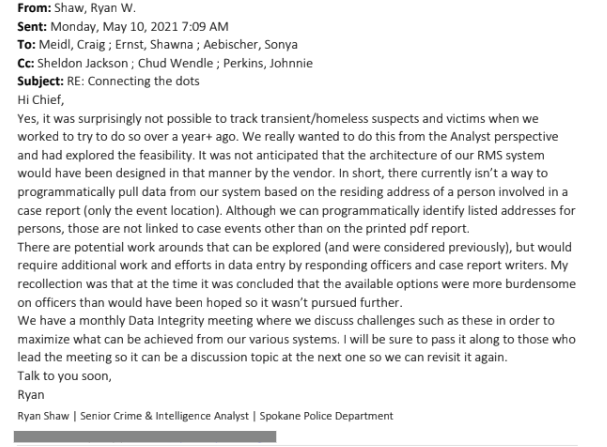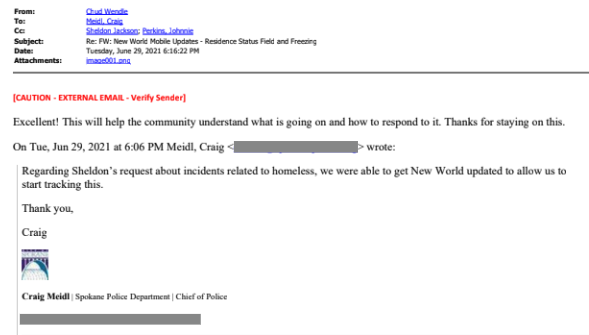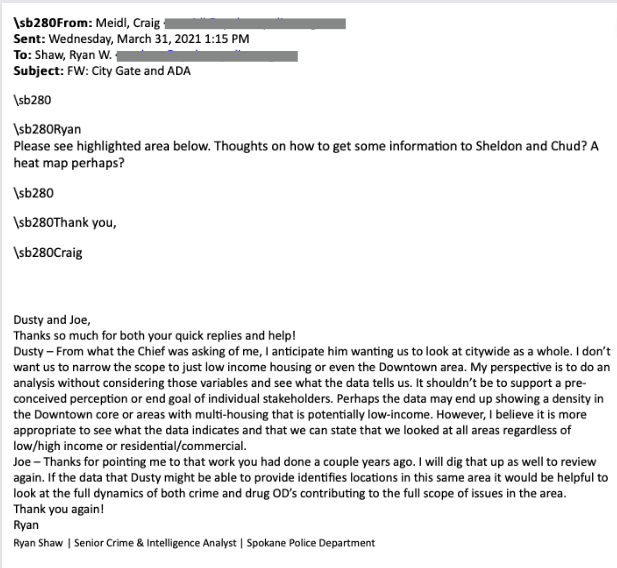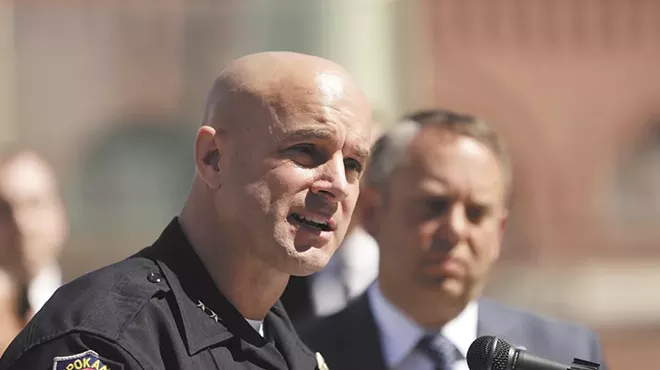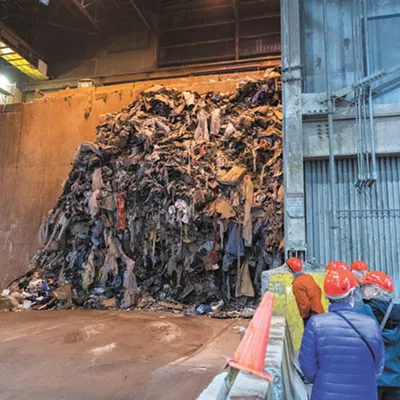For years, the downtown commercial property owner has argued that progressives on Spokane City Council are abandoning the city — letting criminals, drug dealers and transients run wild while the cops' hands are tied. He and the group of aggrieved property owners that he leads — called the
have said they feel like nobody is listening to them.
But one person is listening.
The property owners have a powerful ally, albeit a less vocally combative one: Spokane Police Chief Craig Meidl.
In recent years, Meidl has exchanged hundreds of emails with Wendle and his associates. When Wendle and his business allies want information — like data on crimes tied to homeless people, numbers on fatal overdoses near low-income housing or information about specific criminal incidents — they'll reach out to Meidl directly. And the chief will give it to them.
In some cases, when the information Wendle and his associates were looking for wasn't immediately available, Meidl directed an employee to compile it for them.
In other cases, when the information was preliminary or not ready for public release, Meidl sent it anyway, and asked that Wendle and others not share it publicly.
The business owners make their goals clear in the emails: They want the information about crime and homeless people so they can lobby politicians, push for tougher laws and show how elected officials are failing to keep citizens safe.
Now that the communications have been made public, many of the progressives on City Council aren't happy. They feel like Meidl's relationship with Wendle crosses a line, and that Wendle is unfairly attacking them — with direct help from the police chief.
"I feel like the police are targeting council members that maybe don't agree 100% with everything the police are doing," says Council member Lori Kinnear. "There's something wrong... honestly, it's a little bit scary."
It's not just Wendle. Sheldon Jackson, the owner of Selkirk Development, frequently pops up in emails with Meidl and Wendle, and appears to enjoy a similar level of access. Other members of the commercial property owners group are sometimes CC'd or otherwise included on emails to the chief.
"There's this underlying, behind-the-curtain activity going on," says Council member Betsy Wilkerson. "Some people have more access than others."
Wendle says the group was asking questions and seeking data from police so they could better understand crime trends, and work towards the mission of making Spokane the "safest and cleanest city."
Jackson didn't respond to a voicemail and email requesting comment sent on Thursday.
Wendle says the property group also spent time meeting with nonprofits, service providers, City Council members, state legislators and other stakeholders as part of their efforts.
"We have found all of those that we spent time with and asked questions of to be helpful and want the same thing the community wants... safe and clean," Wendle says.
In January, Wendle posted what appears to be a picture someone took of a police computer dispatch system on a private Facebook page he runs for the group of business and property owners.
The screen showed call details for a rape that was reported at the Camp Hope homeless encampment on Jan. 8, 2023.
Jacquelyn Valencia, a police department spokesperson, says in an email to the
"Our officers should not be taking photographs of calls but we don't know who this photo came from," Valencia says. "The information in the photograph is information that someone can do a public records request for and obtain."
The caller's name was blacked out in the picture Wendle posted, but their phone number wasn't.
"City Council members... what if it was your daughter making the call to SPD?" Wendle wrote in his post, which was about someone getting sexually assaulted at a homeless camp a few days prior.
The emails between Meidl, Wendle and others in the business group came to light as part of a police ombudsman investigation, which looked into an August 2020 body camera video that Wendle obtained and gave to a conservative radio host in an attempt to make Council member Wilkerson, a liberal politician, look bad.
Police were investigating an unrelated murder near a house for people with disabilities that Wilkerson owns, and asked to see her outdoor security camera footage. Wilkerson was concerned about patient privacy and asked them to get a warrant. Police were upset and felt like she was refusing to help. The story made it on Fox News, and Wilkerson caught criticism during her run for reelection in 2021.
The ombudsman investigation sought to uncover who tipped Wendle off about the footage.
In the end, it seems Wendle was actually tipped off by a former City Hall staffer — not someone with the police department. But there’s evidence that Meidl played at least some role in helping Wendle get his records request for the footage.
As part of the investigation, the ombudsman’s office reviewed more than 4,700 emails — a “significant percentage” of which were between Meidl, Wendle and Wendle’s associates. They found that Wendle’s relationship with the police department allows him “to bypass the normal procedures the public utilizes to request police services.”
The emails described in the ombudsman report — and additional emails reviewed by the Inlander — show a relationship that, while not appearing to violate any department policies, does raise questions about preferential treatment of commercial property owners who are politically aligned with the chief.
“We have a system in place that should be equal to all citizens, and this is circumventing that system,” Council member Kinnear says.
Here’s one example: In May 2021, Jackson emailed Meidl, Wendle and City Administrator Johnnie Perkins to ask if there was a way to “connect the dots” and see if “vagrants and low barrier housing” were contributing to violent crime. Jackson was frustrated about a recent arson incident, which he suspected was tied to a homeless person.
“Craig, We now need to deal with ‘Stop the Sweeps,’” Jackson wrote. “We can counter activist actions if we can show cause and effect.”
Meidl looped in Ryan Shaw, the police department’s crime analyst, who said the department had explored the idea of tracking transient/homeless suspects and victims about a year earlier, but found that it wasn’t really possible because the department’s data software didn’t allow it, and any workaround would be too burdensome and require extra data entry by responding officers.
Despite that, Shaw told Meidl and the others on the email chain that he would revisit the topic at the department’s next data integrity meeting. Shaw later emailed others in the department, explaining his ideas for a potential workaround. “We were asked to explore a way to capture” incidents involving transients, he wrote, not specifying who did the asking.
One month later, in June 2021, Meidl emailed Jackson, Wendle and Perkins with good news. The department had figured out a way to update the New World mobile system so that responding officers had an option to check a box labeled “transient” when writing case reports and arrest reports.
“Regarding Sheldon’s request about incidents related to homeless, we were able to get New World updated to allow us to start tracking this,” Meidl wrote in the email.
“Excellent!” Wendle replied. “This will help the community understand what is going on and how to respond to it.”
A similar dynamic plays out across dozens of emails between Meidl and the property owners.
“I see a key to the City in your futures….” Meidl wrote to Wendle and Jackson in one email.
"WHO IS CHUD WENDLE?"
When the ombudsman investigators asked Mayor Nadine Woodward the question — “Who is Chud Wendle?” — she paused for a second and laughed.
“He is an individual in the community who has created a platform, I would say, for himself when it comes to representing businesses and commercial property owners and advocating for cleaning up the downtown environment,” Woodward said.
Wendle has spent years decrying the state of vagrancy and crime in Spokane and advocating for tougher enforcement. He’s the executive director of the Hutton Settlement nonprofit organization, and owns several other commercial properties downtown. He also used to work as district director for Republican U.S. Rep. Cathy McMorris Rodgers.
In an email to the Inlander, Wendle says the Hutton Settlement experienced a drastic increase in property crimes and safety issues in 2020, which prompted him to bring other local property owners together.
The group — the Business & Commercial Property Owners Council — has a private Facebook page where members organize, discuss safety issues and criticize local leaders. For a time, Sheldon Jackson, the other especially vocal member of the group, would send daily “camping updates” to a list of elected leaders, with detailed descriptions of the crime, trash, homelessness and drug use he saw on his way to work.
click to enlarge

City Council screenshot
In an October 2017 meeting, Wendle came before Spokane City Council to complain about issues with transients and crime his businesses were experiencing.
On an ideological level, Wendle, Jackson and Meidl share a pro-police approach to politics.
"With the majority of the public against 'Defund the Police' , I wonder if there is a path towards challenging the Progressive Majority," Jackson wrote in an August 2021 email.
Meidl responded, saying it was frustrating to see that less than a quarter of eligible voters had filled out their ballots in the primary. Wendle replied, agreeing that voter apathy is frustrating.
In an email to the Inlander, Valencia, with the police department, says the relationship between Meidl and Wendle only developed because Meidl is part of a public safety group that consists of about 400 people in an effort to make the downtown area better.
When ombudsman investigators asked Meidl about his relationship with Wendle and the other property owners, the chief acknowledged the unusual volume of correspondence, but denied giving Wendle and his associates an inappropriate level of access.
“He is very passionate, very vested in creating a safer downtown,” Meidl said in the interview. “And I honor that because I want that too.”
Others see it differently.
“Emailing back and forth almost daily? I thought that was a little excessive,” says Wilkerson, describing her reaction to the ombudsman’s report. “It seems like an inappropriate relationship.”
Wilkerson says she is outraged and disappointed by the lack of condemnation from the mayor in response to the ombudsman report. Even if the behavior doesn’t explicitly violate any rules, Wilkerson says, it should at least result in a review of department policies.
Wilkerson — who is the only Black council member, and recently announced a run for City Council president — says she used to have a good relationship with Meidl. But ever since the incident with the body camera footage, she says the trust has become “incredibly strained.” They haven't really had any dialogue outside of council meetings, she says.
It’s not just Wilkerson. Many of the progressive council members have appeared increasingly at odds with the police chief in recent years.
“It makes all of our work harder,” Wilkerson says. “The trust factor is so damaged.”
"MUTUALLY BENEFICIAL RELATIONSHIP"
The ombudsman found that Wendle’s “prolific email relationship” with Meidl began in March 2021 and appears to continue to today. In his interview with investigators, Meidl said it’s a mutually beneficial relationship.
Of the hundreds of emails, we’re gathered a few examples that stood out below:
Overdose data
In March 2021, Jackson and Wendle wanted data on overdose deaths in low-income housing ahead of a meeting with Catholic Charities.
Jackson explained that he and Wendle were looking for trends. He argued that the legalization of drugs was having a harmful impact on cities like Seattle and San Francisco, and said the data could help show which low-barrier housing facilities in Spokane were having issues.
Meidl forwarded their request to Shaw, the department’s crime analyst, who looped in the fire department. In emails with the fire department, Shaw indicated concern about bias, and decided to pull data from across the city — not just in the low-income housing Jackson was interested in.
“[The data] shouldn’t be to support a pre-conceived perception or end goal of individual stakeholders,” Shaw wrote.
When finished, the data visualization gave some credence to Wendle and Jackon’s hypothesis. Meidl sent the data to Wendle and Jackson. “Per your request,” he wrote.
Wendle thanked the chief, adding that he had upcoming meetings with the City Council, mayor and Cupid Alexander, then the director of the city’s human services department. Wendle said he was preparing to compile a list of recommendations, which he would run past the chief before sharing publicly.
“Thank you for your support. We are all in this together!” Wendle wrote.
Community police conversations
In May 2021, Wendle was angry with Council President Breean Beggs for not inviting him to a series of closed-door “community conversations” about policing.
“Kudos for your amazing ability of spinning, deflecting, deferring, interpreting and punting,” Wendle wrote to Beggs.
Wendle wanted to have the perspective of property owners at the table but, as Beggs explained in one email, the topic of discussion was mainly race and policing — not the public safety issues Wendle was concerned about.
Wendle wasn’t having it.
Beggs had tried to reassure Wendle by saying the group had members who were “widely representative of lived experiences and varying points of view." In his reply, Wendle compared that to “interviewing the 100’s of drug dealers around Browne and Pacific seeking their recommendations on drug enforcement in Spokane.”
At the end of his rope, Wendle called for backup.
Wendle forwarded his entire five-month email chain with Beggs to Meidl, and asked the chief if he had any recommendations for how to learn more about the group’s true purpose.
“I’m happy to help in any way I can,” Meidl wrote. “Are you available for a phone call today so I may clarify what kind of info you’re looking for?”
It’s unclear what they talked about on the call.
In a subsequent email to Wendle, Meidl wrote: “You and your group are an answered prayer for many who want more voices to be heard related to stopping crime from occurring.”
In September 2021, the police wanted the City Council to authorize the purchase of pepper balls for less-lethal crowd control. Meidl emailed Wendle and Jackson asking if members of the city's Police Advisory Committee could sign up to testify in favor of the purchase. Wendle said he would sign up and try to recruit others.
“Thank you very much,” Meidl wrote. “I think this is one of those important times for the silent majority to have their voices heard.”
The next day, Kevin Piatt, the department’s chaplain, wrote an email to council members, saying their hesitance to authorize the equipment was a “slap in the face” to officers. Council member Wilkerson forwarded the email to Meidl, saying she was disappointed to see the police chaplain inserting politics into policing.
Meidl replied, defending his officer’s freedom to express his opinion. Then he forwarded Wilkerson’s note to Wendle.
“Unprofessional on the council members part. Sad,” Wendle replied. “We will have a good showing on Monday.”
Transient Data
In September 2021, Meidl forwarded a report on transient crime that was compiled with the new data system to Wendle and Jackson.
“When you need current info, please shoot me an email and I will work on getting you the most updated version,” Meidl wrote.
Jackson asked the chief if they could use the data without getting anyone in trouble. Meidl said the data was subject to public records, and that Jackson and Wendle could say they asked for it and received it from him or the police department.
“Everything is above board,” Meidl wrote.
Later in the email chain, Jackson sent Meidl news articles about two incidents — a shooting downtown and a kidnapping attempt — and asked if either were tied to transients. Meidl replied, saying there was no indication the shooting was, and that he would have to get information on the kidnapping.
Non-public information
In other cases, Meidl asked the pair not to share the information he provided. In June 2021, he forwarded the pair homicide statistics in response to a request from Jackson.
“As this was a very brief synopsis for my benefit, I would ask this not be shared (as the information is not complete, but was meant to provide a snapshot),” Meidl wrote. Woodward and Beggs were also included on the email, as were several other property owners.
In his interview with the ombudsman’s office, Meidl says he sometimes shares leads on suspects with Wendle and associates that he wouldn’t share with media or the general public because he trusts that Wendle and associates won’t share it. Sharing the preliminary info can help quell property owner's fears, Meidl said.
In October 2021, Wendle and associates asked Meidl for data on transient arrests. Meidl was on vacation at the time, according to the ombudsman, but still replied and directed staff to work on the request. He asked multiple times that Wendle and his associates not share the information because it had not yet been finalized.
In one instance, when an associate of Wendle’s asked Meidl for a report on a half-naked transient, the chief directed them to make a public records request. In another case, Meidl made redactions to an arrest report himself before sending it to Wendle and others, according to the ombudsman report.
In the final report, the ombudsman’s office wrote that there is “clearly picking and choosing of what information should go through the public records request process.”
In his ombudsman interview, Meidl said it’s helpful for him as a police chief to have access to Wendle’s network of business owners. Sometimes he’ll take an extra step for Wendle, but much of the information is stuff he’d share with anyone who asked, Meidl said.
It's important to note that police will often send media outlets various crime statistics when we ask for them. Meidl also said in his interview that other groups like neighborhood councils will ask him for police information.
But the sheer scale of the chief’s correspondence with Wendle — and the fact that Wendle is such a vocal critic of Spokane's progressive politicians — is enough to raise eyebrows on City Council.
Wilkerson says she and other council members will often ask police for information during council briefing sessions, and have to wait weeks to get a response. She doesn’t think that happens when Wendle asks.
"If every citizen doesn't have that same type of access, it's discrimination," Wilkerson says.
♦





